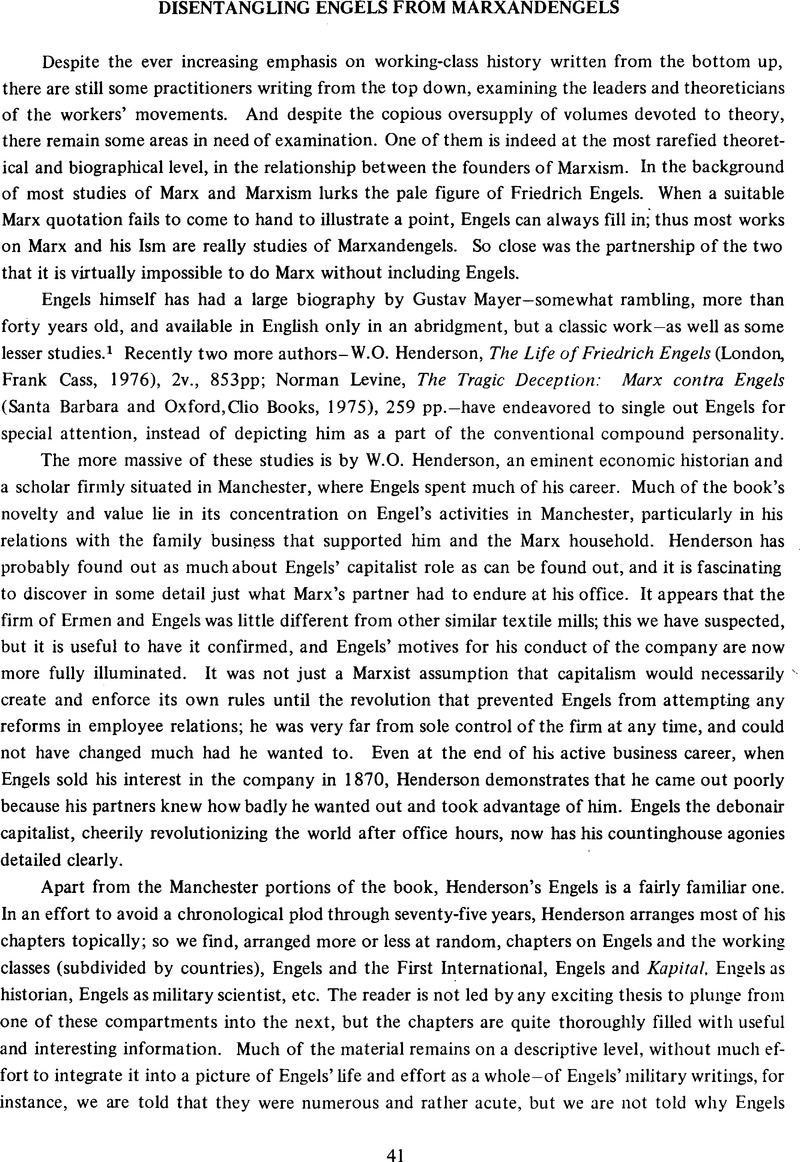No CrossRef data available.
Article contents
Disentangling Engels from Marxandengels
Published online by Cambridge University Press: 16 December 2008
Abstract

- Type
- Essays
- Information
- Copyright
- Copyright © International Labor and Working-Class History, Inc. 1977
References
1. Mayer, Gustav, Friedrich Engles. Eine Biographie, 2 v. (The Hague, 1934); abridgement trans, by Gilbert, and Highet, Helen, edited by Crossman, R.H.S., New York, 1936,Google Scholar reprinted by Howard Fertig, 1969; Carlton, Grace, Friedrich Engels: The Shadow Prophet (London, 1965);Google Scholar and Stepanova, Yelena, Frederick Engels (Moscow, 1958).Google Scholar
2. As George Lichtheim considered him; Marxism (New York, 1965), pp. 234–35.Google Scholar
2. Mayer (I, 77) noted that Engels was a disciple of Strauss, Börne, and Hegel before settling on Marx as his master; more recently a psychologist, though impressed by Levine's Marxian scholarship, has dismissed the psychohistorical content of The Tragic Deception as rather superficial; Birnbach, Martin, Journal of Psychohistory, (fall, 1966), pp. 246–48.Google Scholar
4. Lichtheim (234-43) has a fine concise discussion of this matter, including a recognition of some of the considerations of audience and milieu that helped to shape Anti-Dühring; an outstanding recent treatment is Helmut Fleischer, Marxism and History, trans. Mosbacher, Eric (New York, 1973).Google Scholar
5. The Record of an Adventurous Life (New York, 1911), pp. 253, 256, 259.Google Scholar
6 . “Ernst Moritz Arndt,” Telegraph für Deutschland, 01. 1841, Marx-Engels Werke (Berlin, 1968–1974)Google Scholar, Ergánzungsheft 2, pp. 118–31. Arndt is praised for avoiding the excess of Jahn. Engels’ denunciation of Germans and their governments could be assembled in considerable quantity.Google Scholar
7. Liebknecht, Wilhelm, Karl Marx: Biographical Memoirs (Chicago, 1908), p. 150.Google Scholar
8. “Die Niederlage der Piemontesen,” NRZ, 1 April 1849, MEW, VI, pp. 388–89Google Scholar (also in Engels, , Ausgewählte militarische Schriften Berlin, 1958–1964, I, pp. 148–51;Google Scholar“Der magyarische Kampf,” NRZ, 13 01 1849, MEW, VI, p. 166.Google Scholar A third article cited by Levine on p. 47 as Marx's work is not attributed by the Werke editors to either Engels or Marx. “Die auswartige deutsche Politik und die letzten Ereignisse zu Prag,” NRZ, 12 07 1848, MEW, V, p. 202.Google Scholar
9 . The Eastern Question: A Reprint of Letters Written 1853-1856 Dealing with the Events of the Crimean War, edited by Aveling, Eleanor Marx and Aveling, Edward (London, 1897; reprinted by Burt Franklin, 1958).Google Scholar


